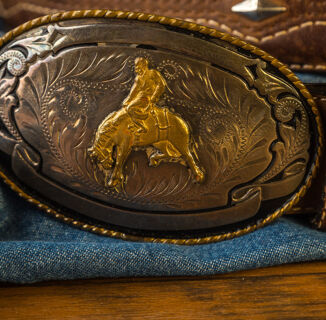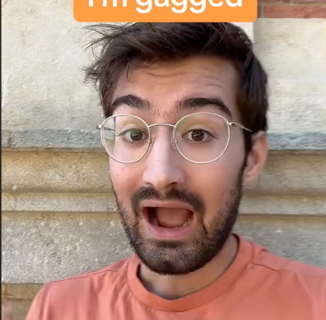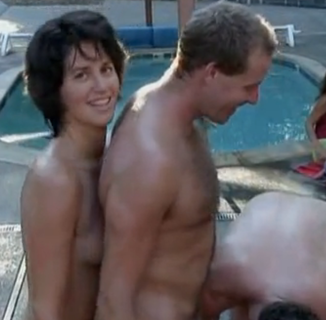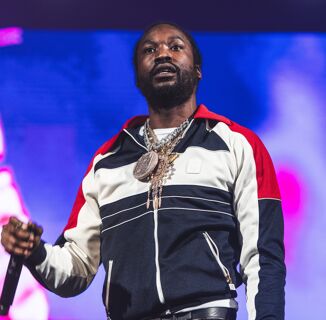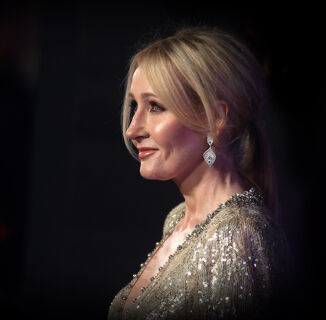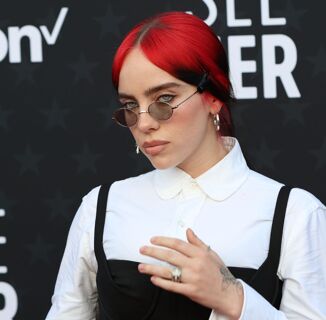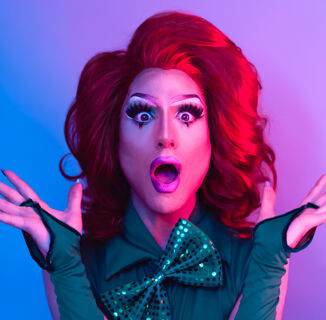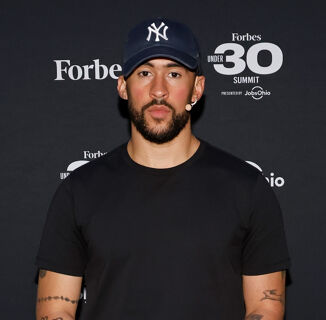When most people first encounter The Breeding, they’re struck by one of the many scandalous ways it’s framed by media. The film is about BDSM and race play and it stars Marcus Bellamy, a Broadway dancer who was charged with murdering his partner. It’s what most headlines have chosen to emphasize.
But to the film’s writer, Dane Joseph, The Breeding is much deeper than its controversies. He began writing the film during a time when Black Lives Matter was entering the cultural conversation, and Joseph says it’s an exploration of race relations in America via the story of one Black man’s sexual desires. Joseph spoke with INTO about the initial idea for the film, fetishizing Black bodies and why he chose to open the film with an image of a Black man in a cage.

When did you first get to the idea to write this film?
I went to an art gallery show at a gay art gallery here in the city called the Lohman and I forget what the actual theme was, but in the art show there was a painting of this white man holding this Black man and there was a poem around the edges. I read the artist’s description and he said it was based on this incident that happened between a slave owner and his slave in which they were caught having sex and they were arrested and took off running and they ended up drowning in a lake while on the run. And I included the story in the film. I was struck thinking about the love relationship going on. How much agency did the slave have in that situation? I started thinking about like, what if you are a gay white male in power, I’m sure you could’ve easily — we know slave masters were intimate with female slaves, so I’m sure it happened with male slaves, too.
I started digging into that and seeing how that worked and if there was any research and in doing that I came across this form of BDSM called race play and my mind was a little blown because I had never thought about that. I saw how offensive it was, and it’s also in the straight community. So I started wondering what the mindset is of someone who would participate in this kind of play and that’s what it was. It was not to pass judgment or kink shame. It’s an exploration of thoughts via this story. While I was writing it, the Black Lives Matter movement was heating up in the cultural conversation and the LGBTQ community is pretty quiet on matters of race because the voices you hear are primarily white men who are probably affluent. So if we could have a gay eye on the Black Lives Matter movement and the complex relationships that minorities have with America, this kind of love/hate complicated mess, especially for Black Americans because we were brought here.
You bring up Black Lives Matter a lot in this film, especially through Thomas’s boyfriend who is a journalist. How do you see this film enter that BLM conversation about violence to Black bodies?
I hope that it injects it into the LGBT community because race is so largely absent from our conversation, though we do know it’s pretty obvious that our community can be very racial. You see “no Blacks, no Asians” on profiles. Or “I like Blacks, I like Asians,” but the messiness of it all, we don’t really hash out and discuss. I hope that it will start a conversation, whether you disagree or not with the film. That was the main hope, was to start a conversation. Also, I do think there’s something about the complex state of Blackness in America that does have a violent history to it. You have people telling you you need to stand up and respect the flag and recognize this is the greatest country the world. This is a country that has also been very unfair toward people of color and has not yielded. You have people burning their Nikes! You’re always taught to love a country that does not always love you.
When you’re a Black person, you want to be loved by the thing that you love. We want to be loved but it’s by something that doesn’t love us. It will drive you crazy. Thomas is always seeking out this love and affection from the other. He also has a boyfriend who is there, who is loving and caring for him the other time. But he’s obsessed with [the other] at the expense of his boyfriend who does love him. And ultimately it does go awry and leads to consequences that were not intended.
The film is thinking a lot about two Black men dating vs being in an interracial relationship. Is this something you think Black gay men don’t talk about enough — dating within vs. outside of their own race?
You know what, I think there’s a stigma sometimes, on both ends. I don’t think you get to see many relationships of two Black men who are in just a healthy functioning gay relationship. That image is not very prevalent: two gay Black men who are healthy and love each other. You see a lot of Black gay men finding love with white men. The idea of Black love is celebrated and treasured and on the opposite end there is a stigma of dating outside the race, like “I was just dating that person because they were white.” There are people who will date only white men because they say it’s “Just a preference,” like, “No shade that’s just my type.” And I do always question why — if you’re not attracted to dark-skinned people of your own race, why is that? Why is your perception that you only find people who have white features different from your own attraction. On the same end, I have a white husband. But I will say when we first started dating, it was difficult for me. I didn’t want to be perceived as a person — he’s my first relationship with someone outside my race. I was very honest at times with like, I don’t know if this will be for me and I’ve only dated people of color.
He was like, “Dean, that’s racist, you should give me a chance. Why would you care what other people think?” On one end you want to have this image of Black gay love as unapologetic and healthy and on the other end, the heart wants what the heart wants and we need have to an honest open conversation about it.
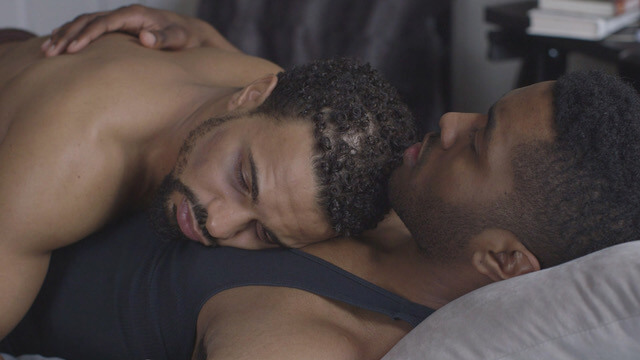
You also have a white character with a fetish for Black men and even one of the characters comments that Black men shouldn’t just fall for “any old white thing they come across.” What role did the white character play in the story?
I wanted to go both ways. I wanted to see a Black person lusting after whiteness, and I also wanted to show a Caucasian character lusting after Blackness. You have the myth of the Mandingo and the lust for the BBC and you know people saying they want that BBC. It’s a fetish, that idea of the Black manhood that is sought after and lusted after sometimes. But I think it’s equally dangerous. It’s dehumanizing, to an extent. It’s not that I like the person, it’s that I like what that person represents. It can happen on both sides. Some people will think it’s flattery but in reality, it’s dehumanizing. I think in my judgment, in each interaction that character, his name is Jackson, he’s using those people to further his art along. He’s doing the video installations. He, in the film, is symbolic of something larger about American society. In America, we love Black culture and we don’t always love Black people.
There are white artists who will take elements of Black culture, they’ll Kardashian it up, make themselves cool with it at the expense of people of color not benefitting from it. America loves Black culture while treating Black people as second class citizens.
For Jackson, his fetish eventually ends with him being mugged. What was the thought process behind that scene?
When it was written, I had a full backstory for this young man, but it went a little long. It was about what forces people to make money and go into that situation. Just “make that money” and go for this kinda creep guy and they’re teens who are just making a quick buck to get out of a situation. And people do things they don’t normally do. There was more backstory in terms of why they did what they did. In terms of why he did what he did, you can see that he still — he’s basically using them for his own sexual gratification and his own art and he still doesn’t trust them. Their bodies are able to be sacrificed if at any point he felt uncomfortable or threatened. As for where that whole scene came from, it was a sense of desperation from the young men and out of that desperation and trying to get a quick fix, this person who doesn’t care about them ends in tragedy.
The film has a lot of religious motifs — it starts in a confessional role-play situation. You mention the curse of Ham. How did that make its way into the film?
Well, the Black church is very important in the Black community. We were colonized by Europeans, right, especially the Christian Church. In the Black community and of course in America, that same religion was being used to keep us under control, and so kinda playing with that. It was used to justify, you know “the curse of Ham,” why Black people should be enslaved or why there’s a racial order. Today you’ll see people doing not what Christ preached and justify it by religion. Recently in the news when Jeff Sessions justified putting kids in cages because of the Bible. It’s insane sometimes to me. And so I wanted with religious imagery, I always wanted to weave it into the narrative to keep it as an undercurrent, the complex relationship that religion has in the American dialogue. It can be perverted. That’s where the energy and language came from.
The main character of the film gets called a racial slur during a phone jerk off session and then eventually does choose to seek out the person who called him “monkey mouth.” In one scene, the main character finds race play images online and masturbates to them but also cries because he’s ashamed. Is there something there about like simultaneous repulsion and attraction?
I find it fascinating and it’s what motivated the film. People are sometimes doing things they’re ashamed of or, logically speaking, they think they should be ashamed of but they’re drawn to whatever it is that’s taboo. I find people generally interesting and fascinating and wanted to explore that. I’m not a psychologist. But I do think that these are conversation starters. We may not know why we’re attracted to something, but I wanted to end the film on a note of us being animals with very being base instincts. That’s the conclusion I wanted to get to: that we’re drawn to things we don’t have much control over. Whatever reason we’re being programmed or how we’re experiencing things to the world is just this want or this crave or need or desire, we don’t know where it’s coming from.
The film opens with a scene of a Black man in a cage. Did you want that to act at all as a metaphor for mass incarceration? Did you think about that when filming it?
Yes, definitely. That was a big thing. A Black man being locked up. To me, that lack of freedom is something that I wanted to play with as well as the director, Daniel Armando. He introduced the motif of the birdcage. He found that on the street and as an artist was inspired by it. Because it does hearken back to Maya Angelou’s I Know Why the Caged Bird Sings — being fascinated by entrapment. It’s something we wanted to play up and to deal with. So that was in our minds.

There’s a scene where the main character, Thomas, gets blindfolded by the older white man and we the audience are also blindfolded and don’t get to see what happens. Was that in the original script?
That was in the script, not knowing what turn it was taking. Each time I see people not know what’s happening in the moment and it’s really intentional because like that in the blink of an eye and in the next moment, you’re in a whole world of trouble. It’s like a life lesson. Period across the board. You think you got into one thing and you got hoodwinked. It’s that old switcheroo that’s part of the American story in terms of our “manifest destiny,” a lot of trickery and treachery. There’s a metaphor in that, too, but also anything in life — keep both eyes open.
You have the sir read the story of the slave/slave-master relationship of Enoch and Alex to his boy, who is Black. Why have him read the story?
I almost cut it, honestly. The reason why I kept it in there is because I wanted to make the point that this was about love. It was not about hate or something like that. To me, that character reading that story, it was meant to underscore that there is no malice meant here. This is a love relationship, a special relationship between a master and his slave.
I don’t pretend to be an expert on dom-sub relationships, but there is not a malice meant there, that much I do know. And I’m taking it back to an actual point in time when there were masters and slaves legally here. People use the term “master” and “slave” nowadays, but when it’s a hard fact that there were really were masters and slaves and not by choice, I think it raises questions of things to think about in terms of how we treat each other’s humanity.
Have you gotten any feedback about that from people in the BDSM community? Because so much of BDSM is about consent and exploring fantasies in safe spaces and this movie is about someone who gets duped and doesn’t consent to everything that he’s doing.
People who haven’t seen it have accused it of kinkshaming almost and once people see it and they get into the idea that this is a fantasy, this is a tale and it’s a specific situation, I haven’t had many people … One gentleman who applauded the movie thought that the sex workers weren’t portrayed in a fair way but I think those two young men who were with Jackson…they weren’t sex workers. They were just hustlers making a buck. This is first and foremost an allegory and once people know that they’ve gone along for the ride.
Have you gotten pushback from Black gay men about the film? I’ll be real, I tweeted about it and a lot of my Black gay following just didn’t like it based on the description.
The articles that I’ve seen have announced it like, “Here’s a movie about race play and a man in a cage!”
When it’s just framed as “here’s an erotic thriller about race play,” you know, people who have not seen it online, people seem to be less forgiving or they’re up in arms about kinkshaming or this is racist or what the hell is this. When it’s framed as an examination of race relations in the LGBT community, people have been a lot more open-minded to it. So I haven’t had and in terms of in person, people who have actually watched it, I haven’t had any negative reactions from Black gay men. Most people say thank you and that it’s important. So I’ve been grateful because I was very scared, every time we screened, I was very scared to screen it. Minority audiences have really taken to it and are appreciative.
Our film hasn’t gotten into any LGBT festivals and so it seems like the people who have been the most reserved about the film are the mainstream LGBT film festivals. But the Black community has been more engaged and wanting to talk about it. Once they get a chance to get into and actually watch it.
The Breeding is available to stream on VOD on September 11.
Help make sure LGBTQ+ stories are being told...
We can't rely on mainstream media to tell our stories. That's why we don't lock our articles behind a paywall. Will you support our mission with a contribution today?
Cancel anytime · Proudly LGBTQ+ owned and operated
Read More in Culture
The Latest on INTO
Subscribe to get a twice-weekly dose of queer news, updates, and insights from the INTO team.
in Your Inbox

